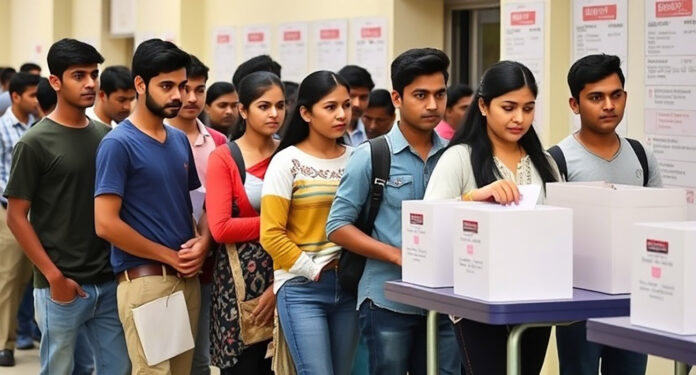As Maharashtra gears up for its 2024 assembly elections, Generation Z (ages 18-25) stands as a pivotal demographic. Despite their potential influence, many Gen-Z voters are increasingly disengaged from politics, driven by mistrust in leaders, a sense of under-representation, and bureaucratic inefficiencies. This article examines Gen-Z’s potential impact on Maharashtra’s political future, the roots of their disillusionment, and the broader consequences of their declining electoral participation.
The Growing Disillusionment of Generation Z
With nearly 10 million eligible voters in Maharashtra, Gen-Z makes up approximately 13% of the electorate, a substantial force with the power to drive change. Historically, young voters have helped shape policies and supported progressive reforms. However, recent data shows an alarming decline in participation. In the 2019 Maharashtra Assembly elections, youth turnout was only 60%, below the state’s 65% average. This disengagement could affect responses to key issues like unemployment, education, climate change, and social justice.
A primary reason for this disengagement is a widespread mistrust of politicians. A 2023 survey by the Centre for the Study of Developing Societies found that 65% of 18-25-year-olds believe politicians prioritize personal power over public welfare. This mistrust is heightened in Maharashtra, where political scandals and frequent party shifts have left Gen-Z disillusioned. For a generation that values authenticity, politics appears as a self-serving arena, creating a sense of alienation from the process.
Another factor driving Gen-Z’s political apathy is a perceived lack of representation. Despite being a significant voting bloc, young people feel their concerns are overlooked. A 2022 Youth Ki Awaaz report revealed that 70% of Gen-Z respondents felt issues such as education, employment, and digital rights received inadequate government attention. In 2023, Maharashtra’s youth unemployment rate was 22.2%, far higher than the national average of 7.45%. The state’s slow economic recovery, especially in manufacturing and service sectors, has left many young people struggling with limited job opportunities. For Gen-Z, these economic challenges reinforce the perception that the political establishment fails to address their core issues.
Moreover, Gen-Z, as the first digitally native generation, expects efficient, transparent, and accountable governance. Yet Maharashtra’s political infrastructure often falls short. Delays in major projects, such as the Mumbai Metro, and uneven digital access across the state add to young voters’ frustrations. A 2021 NITI Aayog report ranked Maharashtra lower in digital infrastructure than states like Karnataka, leaving rural youth unable to access essential resources for the digital economy.
Consequences of Gen-Z’s Political Disengagement
The lack of Gen-Z engagement could have far-reaching effects. With fewer young voters, political power could shift toward older, more conservative demographics, resulting in policies that do not address the evolving needs of a younger, progressive generation. If parties perceive low voter turnout from Gen-Z, they may further deprioritize youth-centric issues, exacerbating the cycle of disengagement. As democratic participation decreases, accountability weakens, leading to poorer governance.
Additionally, Gen-Z’s disengagement may contribute to increased political polarization. With fewer young voters shaping election outcomes, results may increasingly reflect the views of older, ideologically rigid demographics, pushing parties to adopt more extreme positions. Maharashtra, where political choices are often influenced by regional, caste, and religious identities, could see greater divides if youth participation remains low. This polarization hinders moderate and reformist platforms, which often rely on youth support to gain momentum. Maharashtra, a state with a history of reformist policies, could see these traditions stall as Gen-Z’s absence diminishes the push for inclusive growth.
Another consequence of Gen-Z’s disengagement is the neglect of progressive issues. Young voters generally support progressive views on a range of social and environmental matters, including gender equality and climate action. However, without strong electoral participation, these critical issues may receive less focus from political leaders. This trend is already visible in Maharashtra, where climate policy discussions have been inconsistent. Despite ambitious targets for renewable energy, limited progress reflects a lack of political will, even as climate change ranks among Gen-Z’s top concerns.
Re-engaging Gen-Z: A Path Forward for Maharashtra’s Political Future
To attract Gen-Z voters, Maharashtra’s political parties need targeted strategies that address employment, education, digital access, and climate action. Beyond rhetorical promises, delivering tangible results aligned with Gen-Z’s expectations for efficiency, transparency, and accountability is essential. One effective approach is to increase youth representation within political parties and government institutions. By promoting younger candidates and empowering them with genuine decision-making authority, parties can foster a sense of ownership and trust among Gen-Z voters.
Leveraging digital platforms to create transparent, interactive dialogues with young people could also help rebuild confidence in the political process. Digital campaigns that move beyond surface-level engagement, including real discussions on youth-centric issues, would resonate strongly with Gen-Z. By creating platforms where young people can voice their concerns and witness genuine responses, political leaders can begin to bridge the gap with this vital demographic.
The Road Ahead
Generation-Z holds substantial potential to reshape Maharashtra’s political landscape, yet their growing disillusionment presents a significant challenge. If their electoral participation continues to decline, Maharashtra may face increased polarization, policy stagnation, and weakened democratic engagement. The absence of Gen-Z voters could also lead to the marginalization of key progressive issues that matter to the state’s future. Maharashtra’s tradition of reform and inclusion risks being overshadowed by ideologically rigid, less inclusive policies if this trend continues.
Both the political establishment and civil society must prioritize Gen-Z’s concerns and actively work to re-engage them in the democratic process. Addressing their issues is not only crucial for a successful election but also for the sustained health of Maharashtra’s democracy. Generation-Z’s involvement in the 2024 elections is essential, not just to ensure their voices are heard but to protect the democratic values that will shape Maharashtra’s future.






















